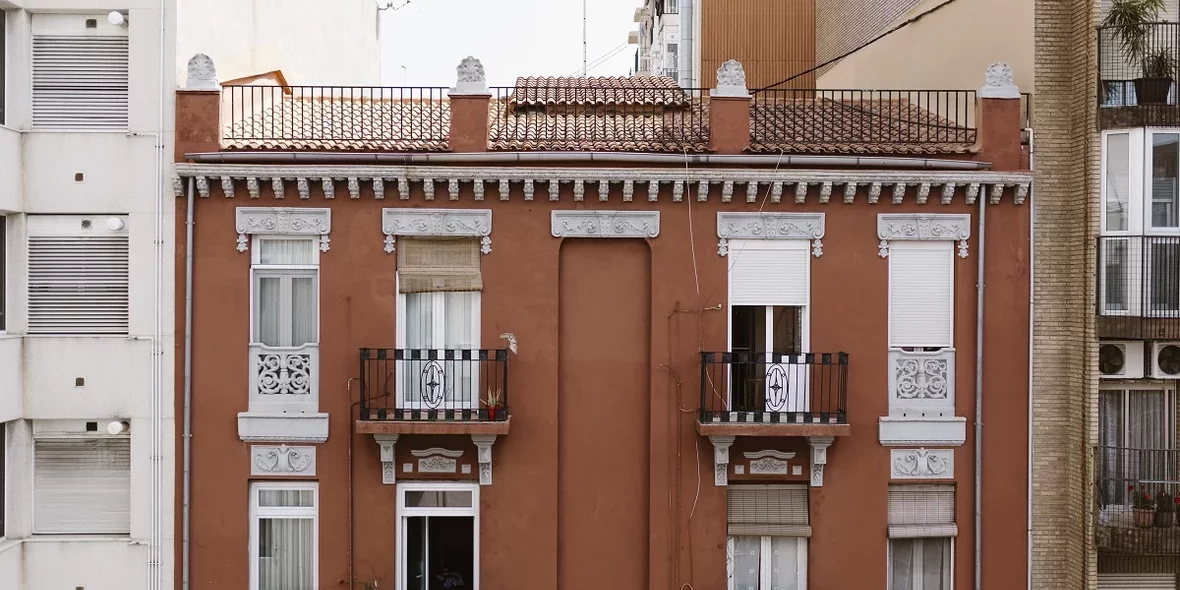
“It Took me Almost 3 Years to Get my Apartment Back.” How Squatters are Occupying Houses in Spain: a Lawyer's Commentary And the Real Story
In Spain, every day (!) about 40 houses are seized by squatters. And it turned out that this could affect absolutely any property owner in this country. But who are these squatters? And why does it take several years to evict them from your own homes? Read the following personal story of the fight for the apartment that lasted three years and the commentary of the lawyer on the problem of okupas in Spain.
“Squatters in Spain are already a separate social phenomenon.”
A Personal Story of the Struggle Against Ocupas
Gala told us about how she faced the problem of ocupas and what the process of evicting them looked like:
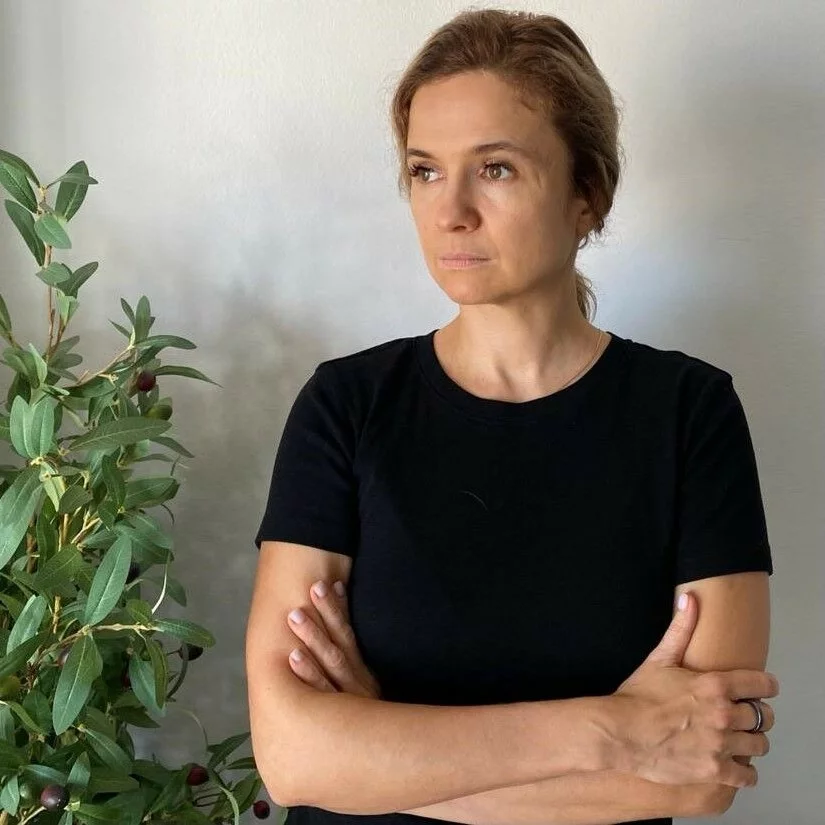
— I live in Catalonia. I took out a mortgage on the apartment (a duplex) and was planning to rent it out for a while. And at the beginning of 2020, I rented it out for a few months; one floor was occupied by one family, and the other was rented by a family of three (parents both of 50 years old and their daughter), who later turned out to be “okupas” (people who squat in other people’s houses and apartments — ed.). This family paid one month’s rent. When the upstairs tenants moved out, this family was left alone in the entire apartment.
When we had already negotiated their departure, I came to get my keys and found that the door to the apartment was blocked. I called them, and the answer was that they were supposedly not at home. In total shock, I called the police. The police arrived when I was no longer there; the squatters opened the door and told the police that they had paid for six months (probably by showing some fake paper). After that, the police called me and said that I now have to go to court because they are now allegedly in my apartment legally.
I went to a lawyer who went the way of the Criminal Code, and, unfortunately, with this lawyer, we lost a year—he filed a wrong application, which the court refused to even consider. And with the second lawyer, we immediately got not only a court date but also an eviction date—this happened in the second year of my litigation.
But the okupas here are quite knowledgeable, especially since they have a lot of information (in particular, the government of Barcelona and Catalonia publishes entire instructions on how to make sure that the okupas are not evicted). Accordingly, these people started to follow these instructions: a few days before the court hearing, where they were to approve the eviction date once again, squatters went to a free lawyer. He, in turn, said that he didn’t have enough time to study the case; as a result, the date of the trial was postponed for another six months, and the eviction date was moved up to February 2022.
So in February 2022, one or two days before the eviction, another action takes place: the okupas say, "We are vulnerable people here, so we can’t evict." The court suspends the eviction and moves the eviction to May.
By the way, this whole story about the vulnerable people soon fell apart before our eyes. Because the okupas went to a free lawyer, social services came to them—they recorded that their relative lived in Catalonia with a place to live and that they could safely move there. Moreover, they came to Barcelona in 2020 as tourists at all.
In May, my lawyer and I came to my apartment, and what we saw: a crowd of people standing outside my entrance and preventing me from entering the entrance; the neighbors called the police, who arrived and called for backup; it wasn’t enough, so they started calling the OMON, which disperses demonstrations like this; but unfortunately, at that very moment there were no cars available and the OMON didn’t arrive. In the end, the eviction did not take place because the court representative was unable to conduct it due to the lack of security measures. And the eviction was postponed again, now to November 2022.
It’s worth noting that by this time a political subtext had also intervened in my case: after February 2022, this family (one of the parents had a Ukrainian passport) started lobbying the idea that by living in this apartment they were waging their little war against the Russian mistress (which, of course, was a bluff, since they had already lived in my apartment for two years before February).
Where did this crowd at my doorstep come from? Apparently, these okupas turned to a syndicate for their protection. There are such syndicates in every neighborhood in Barcelona and Catalonia—they are in charge of calling people to stand up like this and prevent them from carrying out an eviction. These syndicates also have savvy lawyers working for them, so the slightest gesture by the owner will be perceived as a resistance or threat to the okupas; and accordingly, the process of eviction will be delayed for an even longer period. Therefore, in no case should you give in to provocation.
All this time I was watching my apartment through the Instagram of one of the occupiers; I saw that they got a cat and a dog. This, by the way, is also done in order not to be evicted: if a bailiff comes to evict them and sees there is a dog, he can refuse to enter the apartment, because here comes into play the protection of animal rights, etc. In fact, all the okupas know that they can move in children, animals to prolong their free presence in someone else’s apartment.
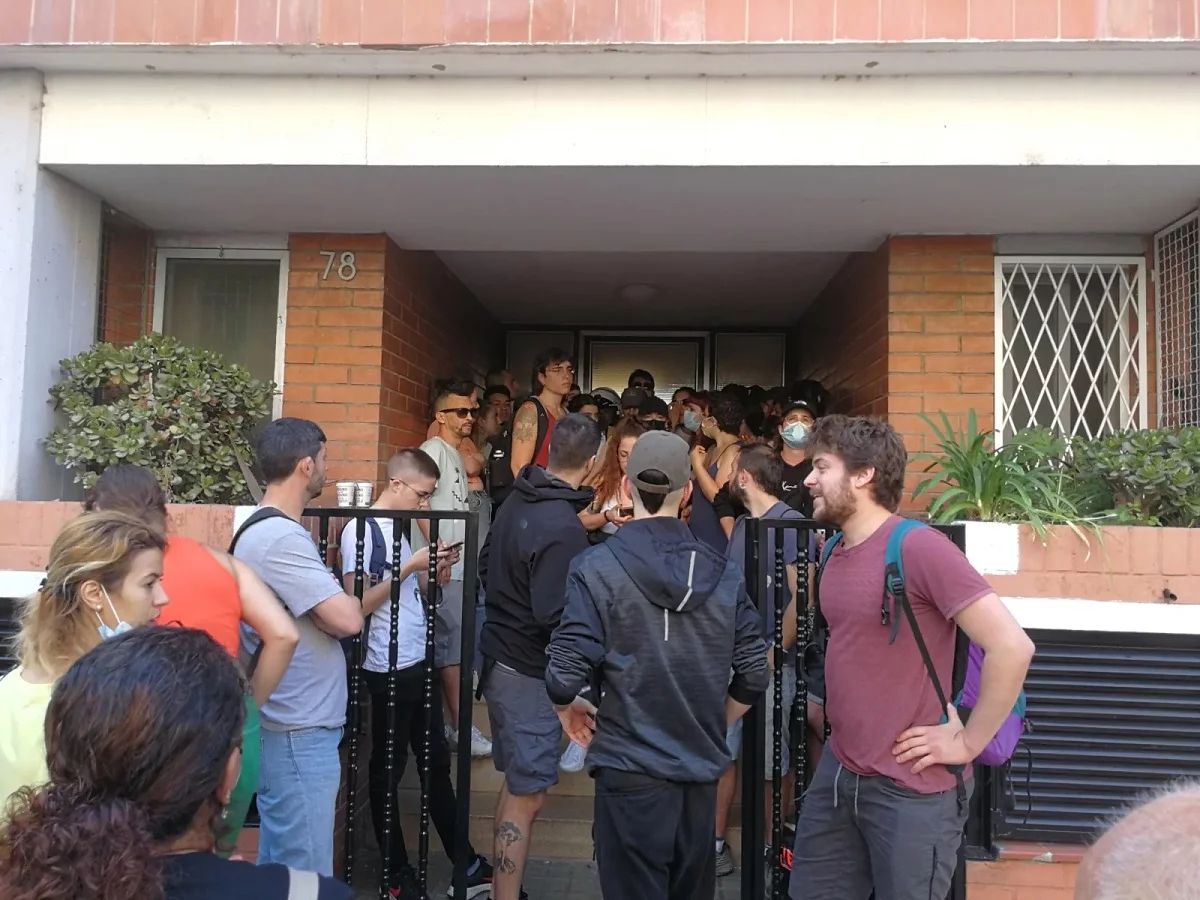
Demonstrators gathered in front of the house to prevent the eviction of squatters (Photo source — Tot Barcelona)
What happens next: November comes around, and a week before the eviction, my lawyer and I start getting calls and messages from people from the aforementioned syndicates; they say, "Come to the negotiating table with us; otherwise, the same thing that happened last time will happen." My lawyer told me that we should never enter into any negotiations with blackmailers. Especially since we’d already had an agreement with the court that this time the OMON would come to the eviction.
The OMON arrived, but the occupiers were no longer in the apartment. The two front doors were closed and locked from the inside, and a dog was barking from the apartment (it turned out that it was a recording in the speakers). It took about 2 hours to open the doors and get inside. The occupants most likely came out at night through the window on ropes (this is the 3rd floor).
In what state do we find the apartment? The radiators are ripped off the walls, the gas heater was stolen, as were a number of pieces of furniture, all were in a terrible, filthy state. In general, I had to re-do repairs in the apartment, as I first did it before I let the tenants in.
It turns out I got my apartment back in November 2022. That is, the whole process took 2 years and 8 months.
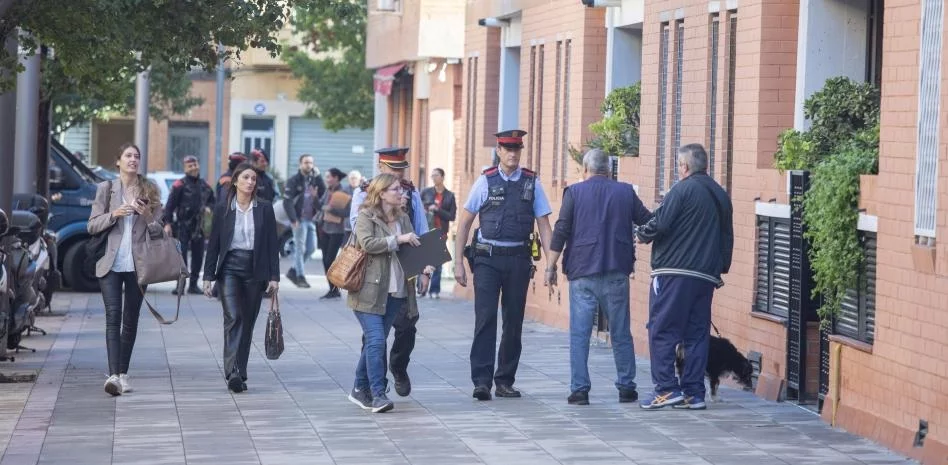
Judicial procession upon arrival at the apartment for final eviction (Photo source — La Vanguardia)
I must say that my case was not an easy one because there were a lot of factors that hindered the eviction. The first lawyer failed to file an application; we lost a year with him, and then political events intervened. A lot of people have it happen more quickly.
Even if an eviction didn’t happen the first time, it’s bound to happen the second time. It’s very common that after the trial, it’s another six months before eviction, because there are whole lines of people lining up for these evictions. The courts do not have enough resources; there are not enough bailiffs to go around and evict squatters. They can do 3–4 evictions a day or so, while there are hundreds of okupas.
As for the consequences for the okupas, they are left with debts for life, but as a rule, it is impossible to get them out of them. All the information remains in the court records, but you have to understand that the squatters are not people who care much about this.
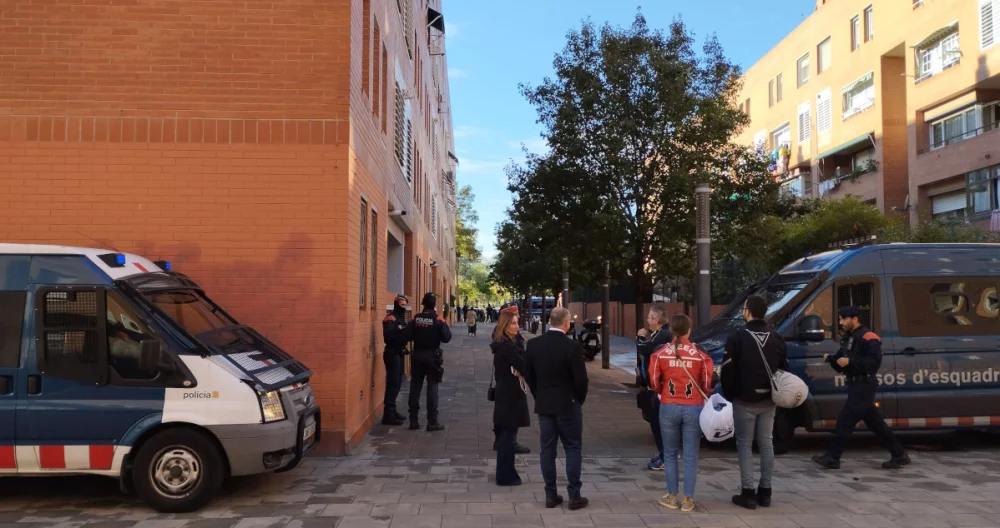
Final Eviction (Photo source — Crónica Global)
You see, people are different everywhere; that’s not the issue. The problem is that in Spain, this kind of behavior is encouraged by the government; there are these syndicates that help the okupas, and this is not punishable. In Spain, squatters are already a separate social phenomenon.
I wanted to add a remark about real estate in Spain. Because of the problem with okupa activity, the investment climate in the country with regard to real estate is not interesting at all, because people who want to buy something here have to protect themselves a thousand times.
What Reddit Users are Writing About Ocupas
Here are some stories on the topic shared by Reddit users:
User msondo recounts: “I have a good friend here who lives on the top floor in a three story building. The apartment directly below hers has been illegally occupied for over 15 years. Apparently, the woman who occupied it had a young child, and the court ruled that they couldn't be evicted because it would endanger the child. The child has finally grown to the age where the law no longer applies, so the owner is now trying to evict them again, but the process has been dragging on for years.”
The same user shares an observation: “I also see a few houses here that are clearly abandoned by the owners but occupied, at least temporarily, by strange people. It's always frustrating to see a house like this between well-maintained houses that could sell for almost a million euros.”
User reddit33764 relays a story told to him by an Airbnb host in Alicante: “His way around this is to make friends with the neighbors, install cameras and alarms so the security company can call the police immediately in case of a break-in. And don't rent to families with children, as ocupas with children are harder to get rid of.”
User paffnuc tells us: “My apartment was occupied by a 'family'. I called the police and they just told me to get out of my house. All I could do was sue them. I now live in another building and there is one apartment there that was taken over as well.”
User TradeFit1826 shares, “This happened in my apartment. Owned it for 49 years with no problems. Visited friends and came back a couple weeks later. Okupas refused to talk to me or leave. I finally paid a private company to do it after realizing how long and complicated the police/civil process would be.”
Many other users in the same discussions claim that the problem is exaggerated and not as widespread as the media would have you believe. Here are some such quotes:
User UruquianLilac writes, “Best marketing campaign for alarm systems. Huge increase in sales since these articles went viral. And it just coincides so aptly with political agendas that present one side as the party that wants your home occupied.”
The same user explains, “Squatting was originally a political and social movement demanding public investment in public facilities and denouncing the institutional abandonment of public property, often for the explicit purpose of speculation and privatization.”
Commented another user, “Spain has serious housing problems, mainly caused by the same processes of speculation that squatters have been opposing since the 80s, but much more acute due to the touristization of city centers, displacing locals through unsustainable rent increases, if not directly through refusal to maintain buildings or direct threats.”
Squatters in Spain. The Legislative Aspect
Squatting in Spain (illegal occupation of property) is a serious problem. The National Organization of People Affected by Occupation (ONAO) reports that in 2022, the number of such squatters in Spain had increased by 20% compared with 2021. It is noted that there are now about 40 home invaders per day. As you might guess, squatters are a threat to real estate investors in Spain, who should take this point into account before proceeding with the purchase process.
It should be noted that cases of such takeovers of houses or apartments are found in different countries: in France, the United States, Germany, etc. But in Spain, it is more global and painful.
Squatting in Spain is made possible by the 1994 Law "Ley de Arrendamientos Urbanos" (Urban Lease Law), which allows people to occupy unused or abandoned properties without the owner’s permission. They must then prove that they have used the property for a certain period of time. The law was intended to provide housing for the vulnerable, but it is now being abused by a huge number of people.
It is important to understand the legal consequences of squatters taking over property in Spain. First, Spanish law explicitly states that illegally occupying someone else’s property is a crime. Article 245 of the Spanish Penal Code states, "Any person who occupies without proper permission a property, dwelling, or building belonging to another person and not his residence, or who remains in the property against the will of the owner, shall be punished with from three to six months imprisonment."
However, there is a big difference in Spanish law between the terms "usurpación" (illegal seizure of something without right) and "allanamiento de morada" (breaking and entering). Trespassing occurs in the case of unauthorized entry into residential premises, in which case there is a penalty of up to four years’ imprisonment. Squatting, on the other hand, usually falls under the category of «usurpation,» that is, a crime committed when the property is uninhabited for some time.
Under current Spanish law, the express eviction of occupants from their occupied housing by the police is possible only within 48 hours of their invasion. After that period, it is possible to evict the invaders only through the courts.
Therefore, in addition to the economic damage, one of the biggest problems is the time it takes for the courts to issue a verdict allowing for the eviction of squatters. According to recent data from the General Council of the Judiciary (CGPJ), final judicial decisions to evict squatters took an average of 18.1 months. This means that it takes a total of more than 1.5 years for owners to get their home back after occupying it.
The undisputed leader in the seizure of residential real estate continues to be Catalonia, with its share of over 42% of the total number of cases. Next come Andalusia, the Valencian Community, and the autonomous Community of Madrid. This is not least due to the policies of many Catalan city administrations, which often openly encourage the actions of squatters and even issue official instructions to them to help slow down the eviction process.
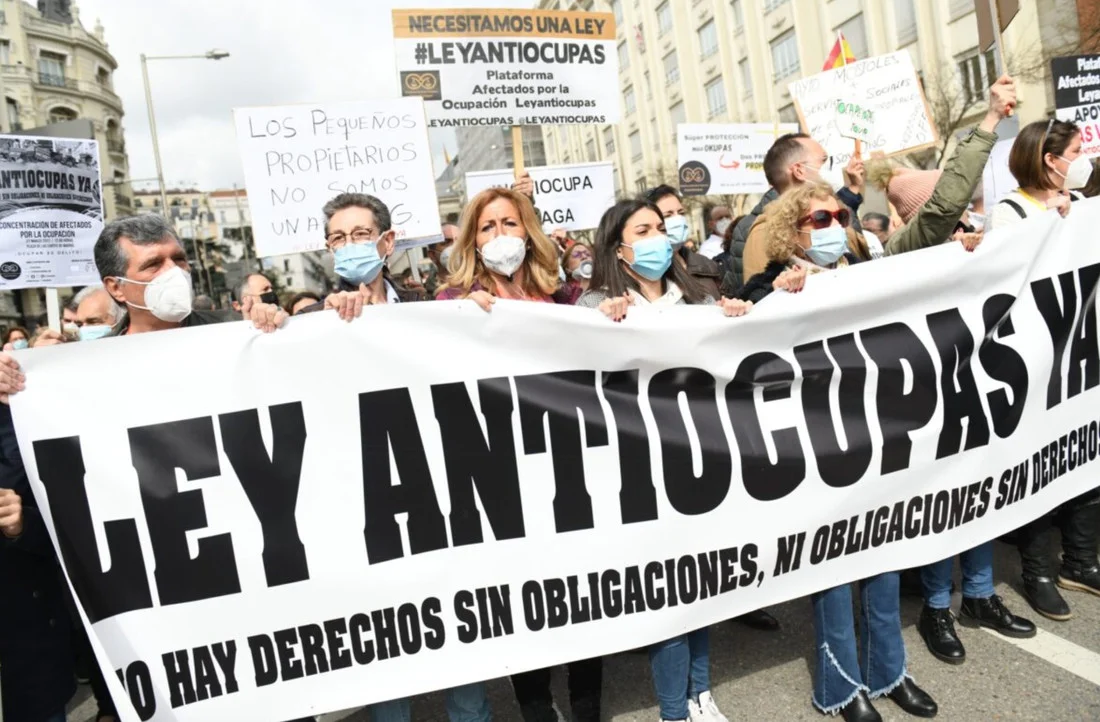
The Pizza Tactic and Other Tactics Used by Squatters
Among other things, the Catalan Autonomous Region is also a place where squatters’ tactics emerge and are then reproduced in different parts of Spain. One of them is the so-called "The Pizza Tactic", which has been active in Catalonia since 2018.
The technique works as follows: the squatters order pizza at the address they have chosen to occupy; they stop the courier and pay for the pizza; they then disappear for two days to occupy the house on the third day; when the police arrive, they can show a pizza ticket confirming that they have been in the house for more than 48 hours. This prevents immediate eviction—when squatters can «prove» that they have been in the house for at least 48 hours, their case must be heard by a judge.
However, lawyer Marc Pairó i Pujol noted the following in our conversation: "I have to say that the police are not stupid at all." "They’re not going to draw conclusions based on a check alone." "They will ask the neighbors about the owners, etc."
Another tactic used by the occupiers is the seizure of other people’s homes in order to get a ransom from the owners. According to representatives of the ONAO, on average, the scammers take from 3 to 5 thousand euros for a quick exit without causing damage to interior decoration, furniture, or household appliances. In this case, 25–30% of this amount leaves the mafia structures that specialize in this type of shadow "business" (search for suitable objects, collect information about the owners, monitor them, etc.).
Also, recently, such tactics as «inquiocupación» (from inquilino — "lodger") have been increasingly spreading. This means that the landlord lets these people into his house himself; they promise to pay rent; then they stop paying and turn into occupiers.
At this point, it’s enough for the okupas to provide a false lease so that a judge can’t order an immediate eviction. Eventually, the judge will conclude that the squatter is illegally occupying the house, but this process will take a long time.
A Lawyer’s View on the Problem of "Squatters" in Spain
Marc Pairó i Pujol, lawyer and partner at Roca Mobility, shared his view of the situation with us.
 — Squatting is not such a big problem as it is believed by many people. In reality, there is much misinformation on this matter. And this is sad, of course.
— Squatting is not such a big problem as it is believed by many people. In reality, there is much misinformation on this matter. And this is sad, of course.
The thing is that Spanish law says: "Every person has the right to accommodation."
So, there are two different situations that may occur regarding "squatters’ matter." The first one is when you leave your apartment for a short period of time and then find out that it is occupied by strangers. Then the law is fully on the owner’s side, and in such situations, the owner will always win in court.
The second situation is when the house is abandoned for many years. In this situation, when the owner accidentally appears and sees strangers in this house, he has a problem. In this case, he doesn’t have many chances to evict these people.
So the most important thing is a quick reaction. Then, it will not be a big deal.
Also, it’s sad to say it, but now it’s big business from both sides. Some people assist squatters in invading the house; on the other hand, some people make money by advising people on how to protect themselves from okupas, etc.
It is also important to note that delays in resolving such issues have nothing to do with the law itself but rather with the courts. Nowadays, the courts in Spain are collapsing under the weight of inquiries from many sides, so this is the main problem.
Author
I am responsible for editorial work. I write expert interviews and guides.























